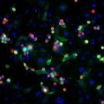(Press-News.org) April 28, 2014 AUGUSTA, Ga. - Patients with highest levels of the most powerful version of the immune molecule HLA-G appear to have the lowest risk of rejecting their transplanted kidney, researchers report.
A study of 67 transplant patients – 50 with no evidence of rejection and 17 with chronic rejection – showed those most tolerant of their kidney had naturally high levels of HLA-G dimer, where two of the immune molecules bind together, said Dr. Anatolij Horuzsko, immunologist at the Medical College of Georgia at Georgia Regents University.
Knowing which form of HLA-G correlates with optimal transplant success could enable physicians to further tailor the delicate balance of prescribing patients sufficient immune-suppressive drugs to keep a donated organ without significantly increasing the risk of infection and cancer, said Dr. Laura L. Mulloy, Chief of the MCG Section of Nephrology, Hypertension and Transplantation Medicine.
"If we know a patient has naturally higher levels of HLA-G dimer they might need less immunosuppression which means less toxicity, less drug complications, and less cost," said Mulloy, a co-author of the study in the Journal of Immunology Research. Conversely patients with low levels might benefit from higher drug doses. "With this information, you can better customize and tailor-make your immunosuppressive cocktail."
High levels of HLA-G dimer also correlated with lower levels of inflammation, an immune response that can lead to rejection. The most successful transplants also had higher levels of HLA-G receptors, noted Horuzsko, the study's corresponding author.
While larger patient numbers are needed, the researchers' findings have continued to hold true in more than 150 kidney transplant patients at Georgia Regents Medical Center to date.
High HLA-G levels are known to correlate with successful pregnancy, HIV infection, and some cancers; low levels correlate with chronic miscarriages. Higher HLA-G levels also have been found in the blood of successful transplant patients, but the specific type was unknown, Horuzsko said.
In fact, HLA-G was thought to exist only as a single molecule until about five years ago, Horuzsko said. Functional assay technology has shown that if positioned just right, two molecules can connect and yield even more powerful tolerance.
Healthy individuals likely have very low levels of HLA-G dimer, which is part of the checks and balances of the immune response.
And, much as some fortunate people have naturally high levels of the good cholesterol, researchers now know that some transplant patients generate higher levels of this powerful HLA-G package, he said.
The tradeoff is the coupling makes HLA-G dimer more fragile so Horuzsko and several biotech companies are working to develop a more stable version that could one day supplement low levels.
Transplant patients are typically prescribed a standard immunosuppressive cocktail to avoid rejecting a new kidney and it's often unclear why some transplants fail and others succeed, Mulloy said. While necessary, the drugs increase the risk of other diseases and can even be toxic to a new kidney. A drug that worked more naturally and locally, "would be perfect," Mulloy said.
Horuzsko envisions HLA-G dimer eventually being delivered directly to dendritic cells, which make decisions about what to attack and ignore. He's already successfully delivered HLA-G carrying, degradable microparticles to mice with skin grafts to enhance tolerance. Ideally, patients would need such therapy only for a few weeks until dendritic cells learn to ignore the new organ. Drugs also are available to boost expression of HLA-G receptors.
Physicians already examine HLA, or human leukocyte antigen, when identifying the best organ donor. When a patient and donor have the same or similar antigens, which are markers for what the body identifies as self and foreign, it increases the chance of a successful transplant.
INFORMATION:
The research was funded by the Carlos and Marguerite Mason Trust.
Toni Baker
Communications Director
Medical College of Georgia
Georgia Regents University
706-721-4421 Office
706-825-6473 Cell
tbaker@gru.edu
Transplant success tied to naturally high levels of powerful immune molecule package
2014-04-28
ELSE PRESS RELEASES FROM THIS DATE:
Wetlands likely to blame for greenhouse gas increases: Study
2014-04-28
A surprising recent rise in atmospheric methane likely stems from wetland emissions, suggesting that much more of the potent greenhouse gas will be pumped into the atmosphere as northern wetlands continue to thaw and tropical ones to warm, according to a new international study led by a University of Guelph researcher.
The study supports calls for improved monitoring of wetlands and human changes to those ecosystems – a timely topic as the Intergovernmental Panel on Climate Change prepares to examine land use impacts on greenhouse gas emissions, says Prof. Merritt Turetsky, ...
Abuse jeopardizes new mothers' mental health
2014-04-28
Ashley Pritchard, a Simon Fraser University doctoral student, is among four authors of a new research paper calling for closer monitoring of new mothers for mental health problems in light of their findings.
The four have advanced previous research that links intimate partner abuse to postpartum mental health problems. They discovered that 61 per cent of all women who participated in the study experienced mental health symptoms.
The open-access journal BMC Pregnancy and Childbirth has published online the researchers' study, Intimate partner abuse before and during ...
Imaging gives clearer picture of cancer drugs' chances of success
2014-04-28
The quest for new cancer treatments could be revolutionised by advances in technology that can visualise living cells and tissues, scientists claim.
Leading edge imaging techniques will make it easier to identify which are the most promising new drugs to take forward for patient testing, a review of the technology suggests.
Applying such techniques early in the drug discovery process could improve the success rate of new medicines by helping to rule out drugs that are unlikely to work.
Researchers at the University of Edinburgh are leading the way in using biological ...
Whitefly confused by cacophony of smells
2014-04-28
Bombarding pests with smells from many different plants temporarily confuses them and hinders their ability to feed, new research has shown.
Biologists at Newcastle University, UK, have been exploring the potential of harmless plant volatiles as an alternative to pesticides in greenhouses.
Testing a phenomenon known as the 'confusion effect' – whereby animals and humans become inefficient at a task when they are bombarded with lots of distracting information – the team pumped a mixture of plant smells into a greenhouse growing tomato plants.
Exposing the whitefly to ...
Dipping blood sugars cause surprisingly irregular heart rhythms in diabetics
2014-04-28
The findings from the research – led by Professor Simon Heller of the University of Sheffield's Department of Human Metabolism and Sheffield Teaching Hospitals NHS Foundation Trust - could offer vital clues to the mechanism by which low blood sugar levels could contribute to life-threatening changes in heart rhythm, a major risk for patients with diabetes.
They also shed important new light on the 'Dead in Bed' syndrome – where young people without any history of long-term complications die suddenly from the disease.
Previous studies have apparently ruled out a direct ...
Penn Medicine experts identify geographic and gender disparities among stroke patients
2014-04-28
PHILADELPHIA - Stroke researchers from the Perelman School of Medicine at the University of Pennsylvania will unveil a map demonstrating geographic hotspots of increased stroke mortality across the United States, among a series of stroke studies being presented at the American Academy of Neurology's 66th Annual Meeting in Philadelphia, April 26 to May 3, 2014.
Hot and Cold: Stroke Mortality Varies Widely, Even in Neighboring Counties
Clusters of "hot" spots - counties where the mortality rate from stroke was as much as 40 percent higher than the national average and ...
Penn neurologists report on promise of statins, estrogen and telemedicine in Parkinson's
2014-04-28
PHILADEPHIA- A trio of studies from the Perelman School of Medicine at the University of Pennsylvania demonstrate new approaches to understanding, treating and potentially staving off Parkinson's disease (PD). Studies show that factors such as estrogen exposure and statin use have an impact on the onset of Parkinson's disease. And a new look at telemedicine demonstrates feasibility in providing care for Parkinson's patients using remote video visits to expand access and center care around the needs of Parkinson's patients. These studies and more will be presented at the ...
Important migratory corridor for endangered marine species off north-west Australia
2014-04-28
The value of Australia's newly established network of marine parks has been highlighted by an international project that used satellites to track the vulnerable flatback sea turtle.
Researchers from Deakin University, Swansea University (United Kingdom) and Pendoley Environmental consultancy used advanced satellite tracking systems to record the passage of more than 70 flatbacks off the north-west Australian coastline.
A high value migratory corridor, more than 1,000 kilometres in length, was pinpointed, with about half the corridor contained within the network of ...
Nature and nurture: Baby's development is affected by genes and conditions in the womb
2014-04-28
A recent study led by A*STAR's Singapore Institute for Clinical Sciences (SICS) found that genetics as well as the environment in the womb play important roles in the development of the baby. The effort by the international team of scientists and clinicians is the world's first attempt to discover how genetic and environmental factors affect the human epigenome . The results have fundamental implications for how epigenetic studies will be conducted in the future and for our understanding of how the mother's nutrition and lifestyle may have long-lasting effects on the health ...
Determining biocontainers' carbon footprint
2014-04-28
GRANVILLE, IL – Many efforts to reduce the environmental impacts associated with commercial horticulture production have failed to influence the general public. For example, one recent study showed that the use of organic fertilizers offered no significant marketing advantage to producers of floral crops. In contrast to the promotion of organic products, the use of biocontainers (plant material-based, biodegradable pots) as alternatives to conventional plastic containers has been shown to resonate with many consumers.
The authors of a new study say that, despite the positive ...


